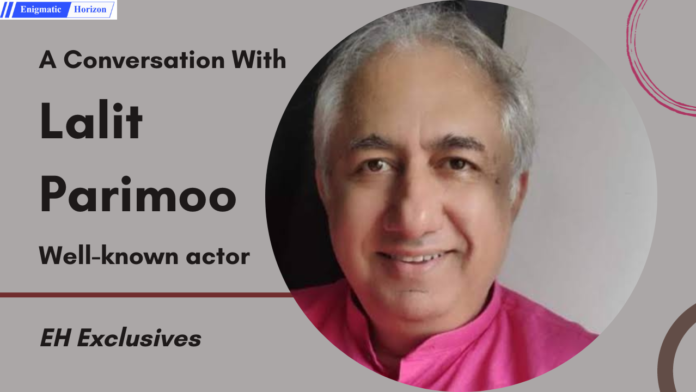Written by – Priyanka Bhattacharya (Sub editor)
Edited by – Robin Bhuyan (Editor-in-Chief)
Interviewed by – Priyanka Bhattacharya (Sub editor)
If you are a 90s kid, you would probably be familiar with the iconic villain Dr Jaikal, one of the main antagonists in the TV show Shaktimaan, the most popular and successful children’s show at the time. The show has had a profound impact on many 90s kids, and the menacing villain Dr Jaikal along with his line ‘POWER’, is something that is forever etched in our memories. Enigmatic Horizon brings you an exclusive interview with with Lalit Parimoo, the skilled actor who played the role of the iconic and devious antagonist.
Although most of us know him for the role in Shaktimaan, he has also appeared in numerous other well-known TV shows and Bollywood movies, such as Haider, where he played the role of Pervez Lone, and the popular series Scam 1992, where he was seen in the role of the CBI Director. Most recently, he was seen in the film Khufia, released on Netflix, as well as Charlie Chopra & The Mystery Of Solang Valley, released on SonyLIV.
Join us in our conversation, as we talk about his journey, his concept of Abhinaya Yoga, nepotism in the film industry, the importance of spirituality, his future plans, etc.
We would first want to hear about your path into the acting industry. How did it all start? Was it an unintentional event or a fantasy from childhood?
It started while I was in class eleven. I started watching movies, and they had a profound impact on me. I had no clue, living in a small town, that the movies would have such an influence on me. I soon began reading magazines and periodicals, including those about films. Soon I began searching across Kashmir for theatrical groups and eventually joined them. I wasn’t fluent in my native tongue Kashmiri back then. I later picked up.
Subsequently, I came to understand that the majority of the performers hail from Delhi, particularly from the National School of Drama. I started making money as a professional actor while I was finishing my degree. I started getting work for TV shows soon after television got popularity. I also began working in radio plays and shows at the same time. Fortunately, the satellite television boom had already begun when I moved to this city, making my job in television simpler. That’s how it all began, and that’s when my time in Bombay started in the early 1990s.
You’re well-known among youngsters in the 90s for portraying Dr. Jaikal. We want to know how it all started. Could you share some of your favorite moments from the show?
While we were working on a TV production named Viraat (Mahayodha), Mukesh Khanna told me that the director wanted to meet me for a role. I first appeared on the show around the 20th or 21st episode. I recall TV production firms, including media journalists, praising Dr. Jackal’s character as something distinctive and intriguing, which was fortunately well accepted by the audience. This is why although the character was only meant for a few episodes, due to my performance as the character, they decided to keep Dr Jaikal as one of the main villains for the show.
There has been speculation of a Shaktimaan film in recent years. Will Dr. Jaikal’s persona be on display? Do you have any connection to the project?
No, I have no ties, but Mr. Mukesh Khanna informed me that he had sold the rights to SONY Television and that they are developing a 300-crore film. Given that we are all seniors now and that Shaktimaan will be portrayed by a man who ought to be in his 30s, I doubt they would employ the same performers twice. However, we are not sure yet, since the scripts have not been finalized, and I’m sure it will undoubtedly be a massive production.

There hasn’t been any Indian superhero that has had a big enough impact even after Shaktimaan stopped airing. What do you believe to be the cause of this?
The reason for this is that it was the first of its type. The writers performed an excellent job, and it was firmly based on Indian culture and the Indian mindset. It was akin to a conflict between good and evil like in the Ramayana or Mahabharata. It wasn’t a spoof of Superman or Batman, to be clear. It had a lot of “Indianness” in it, which is why people were able to connect to it. That, in my opinion, is why it was successful. Kids were affected by it, and the other aspect of Shaktimaan was similar to teaching them how to conduct themselves, behave, and be compassionate individuals. Additionally, that benefited it.
You appeared in Scam 1992, one of India’s most successful and popular web series. How did you find this particular show?
The filmmaker Hansal Mehta, a longtime friend of mine, directed the film that was based on the Harshad Mehta scandal and it showed the road to actual happenings and genuine people. I’m delighted I could be a part of it, and it was warmly received. It was one of the top 20 worldwide shows at the time.
You’re working on a concept known as Abhinaya Yoga. Could you provide further details?
Since my mid-20s, philosophy, and spirituality have always piqued my curiosity. I was deeply enamored of all the great masters teaching philosophy and spirituality when I was 26–27 years old, including Jayakrishna Murthy, Acharya Rajneesh, Aurobindo, Ram Krishna, Paramahansa, and many more. I was also profoundly thrilled by the original texts of our Sanathan Dharma, such as the Upanishads, Bhagavad Gita, Tantra Sutra, and so on. The philosophy that the world, and especially the Indian subcontinent, has been living with for the past 5,000 years captivated me. I used to read these books in my spare time, even on days when I was out shooting. After that, I searched for a teacher—a master—and when I eventually found one, I began my training to become what is known as a Sadhak.
After years of practice, I discovered that there are certain parallels between the yogic and acting processes. The technique of working as an actor is extremely yogic, and it involves a very concentrated concentration. To attain a state of spirituality, Yog, Dhyan, and Dharana ultimately require focus and meditation. The objective of every yoga practice is the one-pointed, focused mind. I was doing a TV series called “Jhoome Jiya Re” in 2007–2008, as I recall. I was portraying an irate father who did not like that his daughter had taken up dancing. He used to yell at her and get upset with his wife frequently. Every day I would start with my emotional experiences, but it helped me realize that if one can learn to express intensely negative emotions, they can be released for a while.
We all have a lot of emotional baggage, and we live in a time of worry, and anxiety. Therefore, everyone should have the chance to let go of suppressed feelings, as these feelings are often the root of psychological issues. These include anger, jealousy, hatred, fear, inferiority complex, superiority complex, possessiveness, and ego, all of which are expressed dramatically in an acting workshop setting. From there, therapy and healing can be obtained. Abhinaya Yoga was thus developed on this foundation.

Do you believe that those with actual abilities are underappreciated in the industry? How do you feel about nepotism?
I disagree that nepotism just exists in the entertainment business. Every businessman wants his son to follow in his footsteps, and it is a well-known fact. However, with regard to exploitation or the lack of opportunities for excellent individuals, I would argue that skill will be always rewarded. These days, there are, in my opinion, a lot of options for those who wish to pursue their artistic dreams. You will therefore have the chance to work in the vast realms of web series, advertisements, theatre, television, YouTube, or short films.
We are unaware of how challenging the industry is and how long it takes to become only a mediocre actor. Becoming a master in your field takes decades. I told myself when I was 19 or 20 years old that if I was going to be an actor, I should be able to support myself and have a respectable life. What constitutes a decent existence now? A good existence for a middle-class individual often consists of having a respectable salary in addition to a house, vehicle, or similar possessions. Of course, this differs from person to person. There may be difficulties ahead if your goal is to become a millionaire. Suppose you train in acting for four, five, or six years, perform in plays, take on tiny roles at first, and then land excellent jobs, you may be able to call yourself a competent actor with a respectable life by the time you’re thirty.
To what extent has spirituality been a part of your life? Do you think that people are getting more materialistic and less interested in spirituality these days?
Without a doubt, the world has grown more materialistic, but people are also becoming more drawn to spiritual concepts and the spiritual realm. The outdated religious doctrines are demoralizing people. Even if there is a lot of politics involved, the dogmatic religion is currently gradually losing ground. You therefore cannot rest whenever you have to produce a performance, be seen by the public, and assume the role of a mass leader or influencer. To own 100% of the entire thing, you need to possess 25% of everything or a little portion of everything. This is my perspective on it.

Aside from Shaktimaan and Haider, what do you consider to be the most important role in your career?
I’ve played numerous notable roles, including one in Maila Aanchal, a 90s TV show which was based on a novel by Phaniswar Nath Renu. I prepared for the part by engaging with locals. I have a strong emotional connection to that particular show and character. Two further programs were based on novels; in fact, I’ve done a lot of literary-based shows, which is why they had such amazing plots. Another programme based on a Bankim Chandra Chatterjee novel was Kapal Kundala. I played the lead role, and it was filmed in Kolkata. My favourites would make up a long list.
What is your advice to aspiring actors and filmmakers?
After picking up a few sleight-of-hand skills, the majority of performers become extremely lethargic and start to place all their faith in chance. It is important to keep working hard. The first step is to hone your skills, which should be a never-ending, unceasing endeavor. Trying to meet the right people is an excellent strategy. Apart from that, I think filmmakers have to focus more on telling tales that are fundamentally Indian, stories that embody Indian culture and values. The filmmakers ought to prosper and work hard to present the true India.
What are your plans for the future?
First and foremost, I would like to perform in more plays with youngsters in the future. I have been imparting knowledge via plays and workshops, and I believe that theatre is the finest form of learning for youngsters. Additionally, I would love to portray the roles that I haven’t yet had the opportunity to play as an actor, and I am now looking for offers of such sort! I am also working on my second book on Abhinaya Yoga, which should probably be out after a year or two. My previous book Main Manushya Hoon is available on Amazon.
Thank you for your time! It was a pleasure talking to you! We wish you the best in your future endeavours!
Thank you very much!
